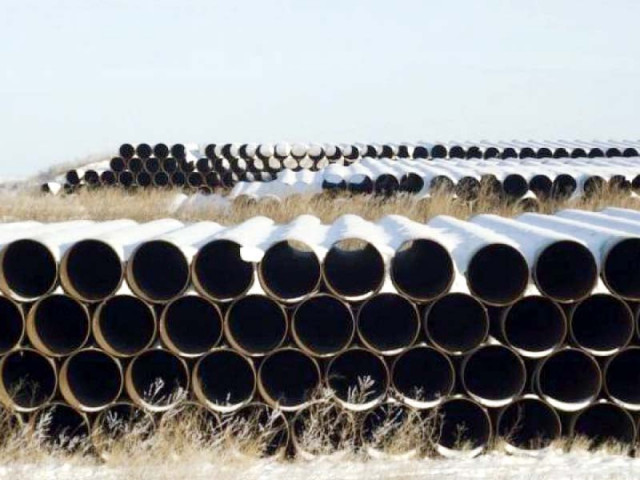Russia turns focus to Pakistan’s energy market
Offers gas export through a pipeline that will run parallel to TAPI project

Offers gas export through a pipeline that will run parallel to TAPI project. PHOTO: REUTES
In a significant development, Russia has offered to lay a pipeline for gas export to Pakistan, a proposal that stems from fears that Moscow will lose the European Union energy market because of a standoff with the US and Europe over the Ukrainian issue, officials say.
Russia has been a major gas supplier to the EU to meet the bloc’s energy needs. However, trade and energy ties between the two sides have soured since last year in the wake of annexation of Ukrainian region Crimea by Moscow, which has slapped a ban on food imports from the EU.
Russian investors interested in Pakistan's energy, auto sectors
Last week, another dispute erupted when Turkey shot down a Russian fighter jet over the Syrian border. Turkey has been meeting 50% of its gas requirements through imports from Russia.
Now, the US is expected to jump in and start exporting gas to capture the EU market, which will deal a big blow to Russia.
On its part, Russia, which is the second largest producer of natural gas in the world, is looking for alternatives and diversifying its export markets. It has already signed a multibillion-dollar energy deal with China. Pakistan could also prove to be a huge market as it faces annual gas shortage of over 2 billion cubic feet per day.
Karachi to Lahore pipeline: Pakistan, Russia seal $2 billion energy deal
“A Russian delegation during a visit to Pakistan last month discussed plans for building a gas pipeline in a meeting of the Pakistan-Russia Inter-governmental Commission,” an official aware of the development said.
They expressed keen interest in laying the pipeline for gas export to Pakistan, which would snake through Turkmenistan and Afghanistan, he said.
Separately, Turkmenistan, Afghanistan, Pakistan and India are working on a transnational gas pipeline, called Tapi, which will also pass through Afghanistan and reach Pakistan and India. According to officials, the Russian pipeline will run parallel to the Tapi pipeline and extend to Gwadar, Balochistan.
Already, Russia has offered liquefied natural gas (LNG) supplies to Pakistan in the next two years to meet its growing energy requirements.
Pakistan and Russia usher in new era of cooperation
They have signed a government-to-government deal for building a pipeline for transporting LNG from Karachi to Lahore. Moscow will provide $2 billion in financing for the project.
In return, Pakistan will award the pipeline-laying contract to Russian firm RT Global Resources without inviting any bids. The company, a Russian state corporation, will build a 1,100km-long pipeline with a capacity of 12.4 billion cubic metres per annum to connect LNG terminals in Karachi and Lahore.
Under the agreement, Pakistan will provide 15% of equity whereas 85% of funding will come from the Russian company. First phase of the project is expected to be completed by the end of December 2017.
Deepening partnership: Pakistan looks to Russia for satiating energy demand
Inter State Gas Systems, which helps develop and implement gas import projects, is working on two pipelines - one from Iran and the other from Turkmenistan. The pipeline from Russia will be the third one if the project is executed.
Published in The Express Tribune, December 2nd, 2015.
Like Business on Facebook, follow @TribuneBiz on Twitter to stay informed and join in the conversation.



















COMMENTS
Comments are moderated and generally will be posted if they are on-topic and not abusive.
For more information, please see our Comments FAQ